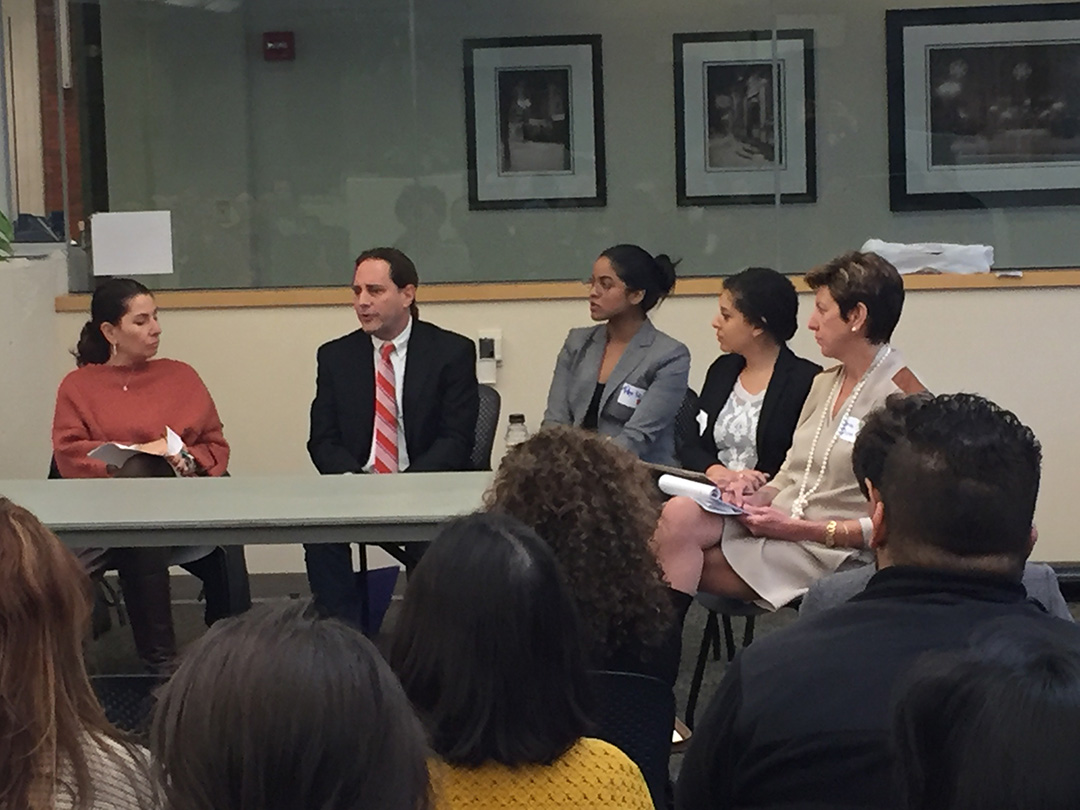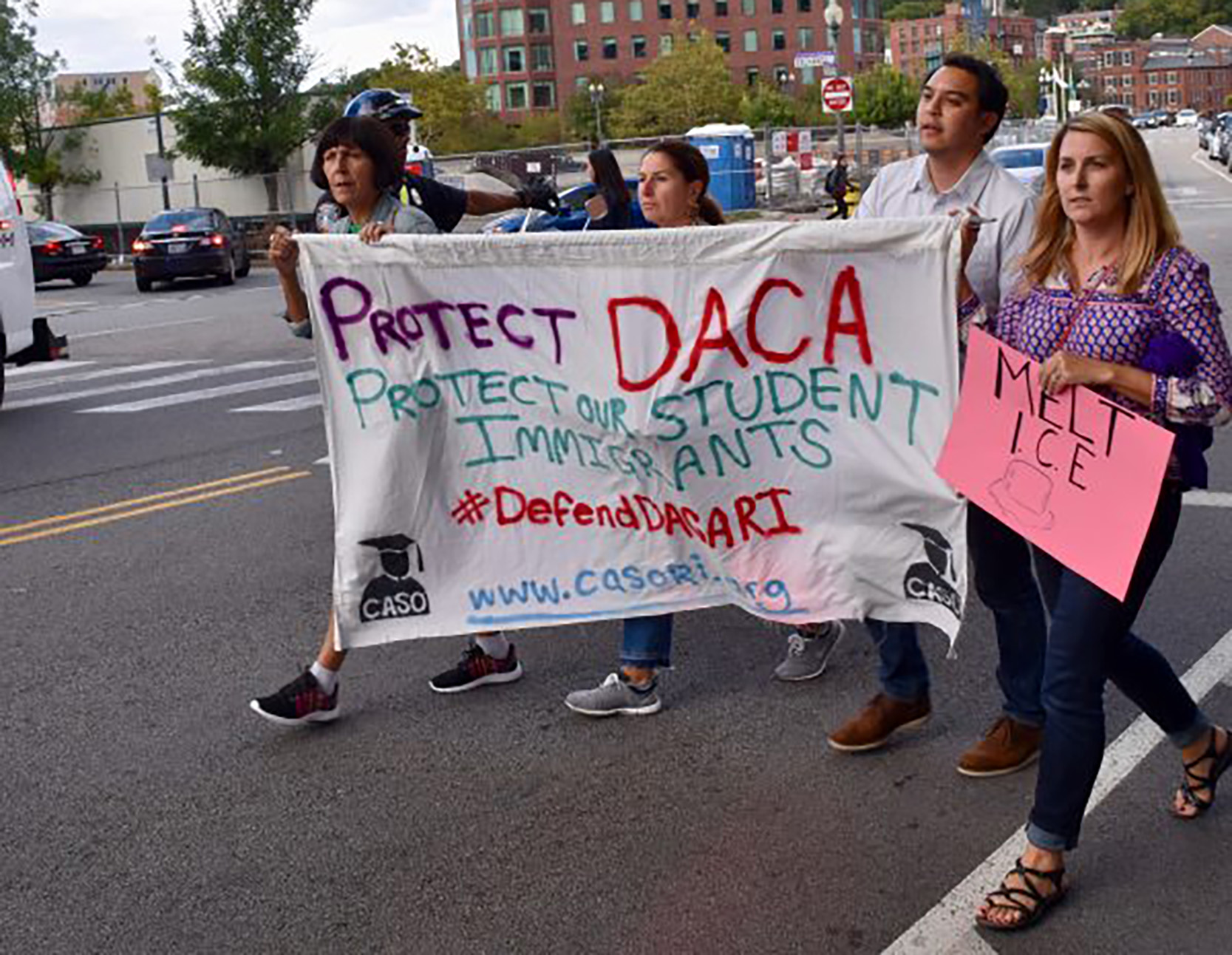DACA Recipients and Financing College
In Rhode Island, undocumented immigrants are eligible to pay in-state tuition rates at CCRI, RIC and URI, including DACA recipients. While we are not certain that Rhode Island law will change, we are certainly keeping our ears and eyes open. It is important to stay informed regarding any state laws that may pass as details pertaining to DACA continue to develop.
If you have been accepted to any Rhode Island State college or university and are offered a “Presidential Scholarship,” you can accept it - in fact, we strongly recommend that you do! DACA students are NOT eligible for the Talent Development (TD) program at URI because it is a federally-funded program.
If you are applying for a private college in Rhode Island like New England Tech, Providence College, Brown University, Johnson & Wales, Bryant University, Salve Regina or Roger Williams University, you are eligible for any private scholarships that they offer. Be sure to inquire, and you should not be afraid to tell admissions counselors about your immigration status. If your grades are good enough to get you accepted into these private colleges, they should be good enough to make you eligible for a private scholarship.
After the appropriate tuition rate for CCRI, RIC or URI is determined the next question will be how to pay for it. DACA recipients do not fit into any of the U.S. Department of Education’s categories for eligible non-citizens, and are currently NOT eligible to receive federal financial aid. They are also NOT eligible for most state financial aid programs. Therefore, most DACA students must explore other sources for outside funding.
Private loan providers are usually less stringent in their application criteria, and, depending on the eligibility parameters, may be willing to provide loans to noncitizen students. Applicants for private loans should familiarize themselves with the loan terms (especially the interest rates and repayment conditions), since private loans may have higher, fluctuating interest rates and are not covered by the guarantees that protect federal student loan borrowers.
Noncitizen students may be eligible to apply for many private scholarships, depending on the eligibility requirements set forth in the application. Private scholarships may be offered by non-profit institutions (in RI apply for the Tam Tran Scholarship), individuals, government agencies from the student’s country of citizenship, and a number of other sources. Student should take advantage of scholarship search engines like the following:
www.fastweb.com
www.finaid.org
www.finaid.org/otheraid/undocumented.phtml
www.collegeboard.org and
www.careerinfonet.org
or contact their country’s embassy or consulate. Students should read the eligibility requirements carefully to ensure they qualify even without lawful status.
What About The Free Application for Federal Student Aid (FAFSA)?
Some colleges may require students to fill out the Free Application for Federal Student Aid (FAFSA) solely for the purpose of determining private aid eligibility. The student must have a Social Security number to complete the FAFSA online. The FAFSA will result in a Student Aid Report bearing the Expected Family Contribution (EFC) that the school needs to determine financial need. In this case, fill out the FAFSA, leaving your Social Security number blank and marking “c. No, I am not a citizen or eligible non-citizen” in box 13 . The application will be rejected and returned to you, but will include your estimated family contribution, which can then be used by your school to determine your financial aid package. However, the DACA recipient will not be eligible for federal student aid and will receive a “C” code on the Student Aid Report requesting documentation of citizenship. Students who do not have Social Security numbers may be asked to submit the paper FAFSA to the financial aid office for a manual calculation of the EFC. All information submitted on the FAFSA, whether online or on paper, must be completely accurate. (NOTE: Click here to see a sample FAFSA form)
To make college costs more affordable, DACA students should also consider alternatives to the traditional four-year, full-time enrollment. In Rhode Island, DACA students may want to begin their postsecondary education at the Community College of RI (CCRI), where in-state tuition is a fraction of the cost of other institutions. After completing transferable coursework at CCRI, you may look to transfer to a four-year college to finish your degree. Likewise, students should also explore the option of part-time enrollment, which would allow them to work to help finance their educational costs.
Important Considerations for DACA Recipients
Since the DACA program is still new and developing, many important concerns remain to be resolved. Because DACA does not confer an immigration status, both students who have received DACA and those whose applications are pending should not travel or study abroad. There are many risks associated with leaving the country and the student should be advised to consult with an experienced immigration attorney before considering traveling abroad for any reason. In addition, DACA students should remain informed as to their rights to confidentiality, especially in regard to release of their student records.
What about traveling to Puerto Rico or other U.S. Territories? It is unlikely that you would be asked to present any immigration-related documents when departing an airport to Puerto Rico or if you travel to any of the U.S. Territories (Guam, Northern Mariana Islands, Puerto Rico and the US Virgin Islands), but it doesn't hurt to have them handy in case. When traveling, be sure to always carry your DACA approval and EAD if you applied for one and received one with you. While traveling to PR be sure to have these documents where they are quickly accessible since U.S. Customs and Border Protection (CBP) does roam the airport and may approach you and ask your for your immigration status. But generally it is fine to travel to Puerto Rico if you are visiting on a school-related trip; be sure to check with your attorney if you have doubts.
Likewise, students who choose to work while in school or enter the workforce following graduation should be familiar with the federal non-discrimination laws that are in place to prevent unfair treatment of noncitizen workers. Personal earned income, as well as certain scholarships may, in fact, be taxable. Since the tax withholding rules, as well as the federal and state income and filing categories for DACA recipients, are not yet clear, the exact tax consequences for DACA recipients are still yet to be determined.
Deferred Action - What's Next?
Following the 2012 presidential election, President Obama made assurances that he would work toward such reform. The goal is to provide protection for young immigrants, and more specifically, those who were brought to the U.S. through no fault of their own and pose no specific threat to national security or public safety.
In order for such reform to take effect, it is necessary for Congress to enact an immigration bill. It appears that more and more individuals and legislators are willing to discuss proposed reform. If the DREAM Act is actually enacted in the manner in which it has previously been proposed, there is a good chance that a number of DACA-eligible students will qualify for pathways to citizenship and many other tangible benefits. It is important to remain cautiously optimistic when talking with students about these issues. Although there is no guarantee, the implementation of DACA marks a major step in the direction toward comprehensive immigration reform.
Click here to read and download a copy of CASO’s Guidelines on filling out the FAFSA Online Application by DACA Recipients ➤
The FAFSA Application and
DACA Recipients








